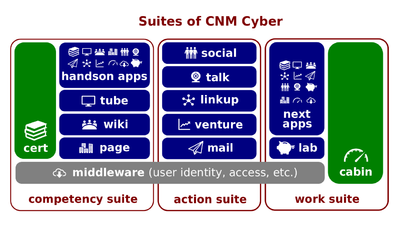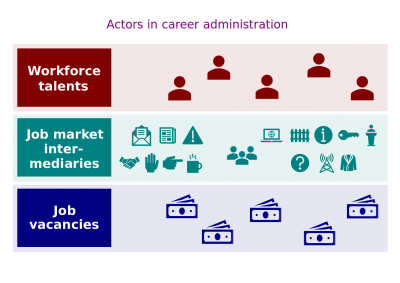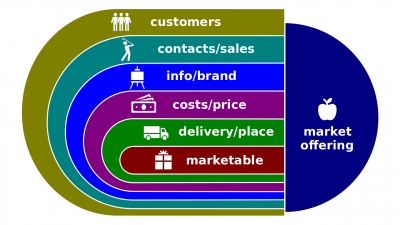Difference between revisions of "Career Essentials"
(→Outline) |
(→Outline) |
||
| Line 26: | Line 26: | ||
|4|| | |4|| | ||
|- | |- | ||
| − | ![[Career | + | ![[Career Strategies]] |
|5|| | |5|| | ||
|- | |- | ||
Revision as of 22:30, 12 May 2020
The Career Essentials (hereinafter, the Lesson) is the lesson of CNM Cyber that introduces its participants to CNM Cyber Orientation. The Lesson belongs to the Introduction to Careers session of the CNM Cyber Orientation.
The Lesson is made up of three lectios. At CNM Cyber, the word, lectio, is used for a lesson part.
Contents
Summaries
Predecessor
- The predecessor lesson is Recruiters' Essentials.
Outline
Career Essentials Lectios # Referred topics What Career Is 1 Value Propositions 2 Career Levels 3 Career Portfolio 4 Career Strategies 5 Career Changes 6
Successor
- The successor lesson is Career Projects.
2019 Career Essentials presentation
The video of the presentation is published at https://youtu.be/TaPcCI0bFuU (3:44). Here is its full text.
Overview
- Welcome to Career Essentials. In this brief presentation, we are going to define careers and take a look at career administration. Let's takeoff.
What career administration is
- Career administration is a set of endeavors undertaken in order to administer one's career. Career can be defined as a long-term occupation and administration in this case is being in charge of that. Vocation is another term related to this topic. It is a strong feeling of suitability for a particular career.
Job market
- Every employment is the match between employers and employees. Future employees offer their talents and employers offer jobs. Talents are on one side and job vacancies are on another side.
- On a casual market, products are rarely sold without intermediaries. In most cases, something or someone should be in between employers and future employees. And this "in-between" includes everything and everyone who can help to match these two parties. Employers and employment candidates at least try to play that role. Nevertheless, if you are a job seeker without direct connections, you can not in any meaningful way to know what jobs are available and how to land them without some sources of information.
- So, we can identify three groups of actors in career administration. One group is owners of talents -- employment candidates. Another group is employers -- owners of job vacancies. The middle group is job-market intermediaries -- workforce service providers, informational resources, relatives, classmates, just friends, et cetera.
Job seeker vs entrepreneur
- Every career can also be defined as an enterprise, which objective is one's employment. We may easily compare every person who is looking for a job or may consider looking for a job with a business in search for its customers.
- This person's work is the product, which this business sells. That business has the name, which is the person's name, his or her performance is the deliverable. Its delivery is being available at employer's place and on employer's schedule. Its price is commonly called employee compensation.
- Eventually, this enterprise needs to build its sales, presentation, and, in some cases, its customers.
- If one is looking for a job, he or she is an entrepreneur. Employment candidates are self-employed and, in most cases, the goal of the business is to sell their time. Whatever is good for an enterprise is good for employment candidates. Career administration can be viewed as no more than an application of business administration to one's career.
Summary
- This concludes the Career Essentials presentation. We have defined career administration and taken a look at vocations and careers. If you haven't done yet so, you are now welcome to move to Career Projects.
See also
- Career Projects. The second presentation in Introduction to Careers.
- Recruiters' Essentials. The last presentation in Introduction to Recruitment.


